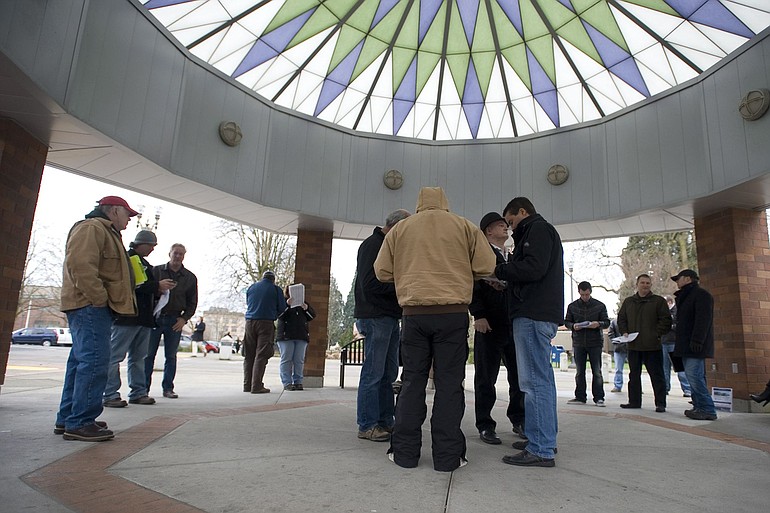Warren Edgley stood unnoticed outside the Clark County Public Service Center as the money men under the gazebo worked their quick deal. Within minutes, the Vancouver property that Edgley had hoped to develop into a 45-unit subdivision with fellow developer Lynn Wiley was out of his hands, going for the minimum bid of $1 million.
The trustee’s sale of land that was to become Hawthorne Acres closed a bitter chapter for Edgley and Wiley, who had obtained their loan from the now-defunct Bank of Clark County. Now they worry that the investment firm Rialto Capital, a subsidiary of the mega-housing development firm Lennar Inc., may sue them for what is called deficiency — the difference between what it obtained from the property sale and the $3.3 million owed on the loan and fees.
“We’re waiting for the other shoe to fall,” said Edgley, after watching the foreclosure auction with his wife, Paula.
Wiley didn’t come to the sale. He instead attended a meeting with other former Bank of Clark County borrowers whose loans are now being managed by Rialto Capital. Wiley estimates that at least 20 Clark County developers are caught in similar circumstances. They’re trying to bring attention to their plight and connect with borrowers from 21 other failed banks whose loans were auctioned last year by the Federal Deposit Insurance Corp. The loans are now being managed by Rialto in a public-private venture that goes under the moniker of “Multibank.”
The offices of Sen. Maria Cantwell, D-Wash., and Rep. Jamie Herrera Beutler, R-Camas, are both looking into the developers’ concerns. Both offices have made queries to the FDIC, and both have been told by the federal agency that it’s the job of Rialto Capital, not the FDIC, to manage the loan portfolio. The FDIC has told both offices that it has asked Rialto to explain “the economics of their decision” to foreclose on Hawthorne Farms. Cantwell’s office also received a letter from FDIC suggesting that Wiley call Rialto if he had any questions.
Cantwell said in a statement she’s concerned about stories she’s hearing from former Bank of Clark County borrowers, adding that she will “fight for greater transparency and hold the appropriate government agencies accountable.”
Casey Bowman, spokesman for Herrera Beutler, said his office spent an hour on the phone trying to reach Rialto Capital before declaring defeat to the company’s automated voice-mail system. That story wouldn’t surprise Edgley, who recounted the trip he and Wiley took to New York, at Rialto’s request, to discuss a possible payout plan that would allow them to keep the property.
At that meeting, Edgley recalls, Rialto’s representatives showed no interest in working out a deal. “They said, ‘Did you win the lottery?’ ‘Do you have a rich uncle?’ ‘Where’s the money?’” he said. “They would not put anything in writing.”
Wiley confirmed the substance of the comments, though he remembered the precise wording differently.
Marshall Ames, spokesman for Lennar, said the Friday foreclosure followed months of discussions with borrowers. “Multibank had been in negotiation with the borrowers since May of 2010 and in this case a settlement was not able to be reached,” he said.
“We are bound by the documents that each borrower entered into with their lender,” Ames added in an e-mail. “If we fail to reach a settlement with a borrower we rely on the remedies made available to us in that document struck between those parties at the time of origination.” He denied that Rialto representatives made the comments recalled by both Edgley and Wiley.
One-two punch
The two developers and many others who fed Clark County’s building boom fell victim to two powerful forces — the collapse of the Bank of Clark County in January 2009, which put their development loans into the hands of the FDIC, and an economic downturn that devastated housing prices and demand. After seizing the Bank of Clark County, the FDIC sold off some loans and held on to others.
In February 2010, the FDIC auctioned loans that it still controlled from the Bank of Clark County, along with thousands of others from another 21 failed banks. Rialto obtained the loans in its public-private venture for $243 million. The FDIC retained a 60 percent ownership, and agreed to provide Rialto with $627 million in interest-free financing for seven years.
Part of Edgley’s frustration is that, in his view, property owners and the FDIC would all have fared better if the federal agency had worked to reach settlements with borrowers, rather than selling off the loans. When the FDIC was still managing the loan, he said, he and Wiley offered a $1.75 million payout. The agency wasn’t interested, he said.
“Everybody loses except Wall Street and this outfit,” he said of Rialto. “Without these uncompromising bill collectors, everyone would be better off.”




